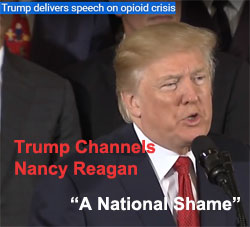Then there was Melania, looking like she just came from the hair salon, still wearing her cape.

She told the stories of three or four people who lost loved ones to drugs. Trump gave her kisses at the end.
Back to Donald: Of course, he tied opioid use to the need for the border wall.
He discussed everything but the few things that might make a difference: Decriminalization and Legalization.
From the Drug Policy Alliance:
“In the face of a devastating overdose crisis, President Donald Trump today made clear his strategy: to stick his head in the sand and point the finger at immigrants. While a couple of his proposals might help mitigate overdose, his speech today revealed a profound and reckless disregard for the realities about drugs and drug use in the United States.
Trump seemed to be saying that prevention boils down to ads encouraging young people to "just say no" to drugs, ignoring the utter failure of that strategy when the Reagan administration started it in the 1980s. He made a big deal about completely taking a certain opioid off the market, even though the opioids involved in overdoses are mostly coming from the illicit market.
He blamed immigrants for bringing drugs across the border, ignoring that immigrants are overwhelmingly more law-abiding than U.S. citizens, and that the illicit drug trade has always found ways to get around the walls and barriers the U.S. has put up to block it.
He held up drug courts as a solution, ignoring all the evidence showing they do more harm than good. And he continued talking about criminal justice answers to a public health problem, even though the war on drugs is itself a major factor contributing to the overdose crisis.
Trump had a chance to do something meaningful to help stem the tide of overdose deaths in the country, including by pushing for greater access to naloxone and adopting other health-based recommendations from his own opioid commission. Instead, he is condemning even more people to death, imprisonment, and deportation in the name of his war on drugs.”
Also from the Drug Policy Alliance:

One idea gaining traction: Supervised consumption facilities. From The Nation:
From Seattle and Philadelphia to Baltimore, San Francisco, and Ithaca, New York, a cohort of cities across the country are embracing the idea of supervised-consumption facilities, as they are sometimes called, to combat the opioid epidemic. Already widely used in Europe and Canada, these facilities provide places where drug users can consume narcotics in the presence of doctors and nurses and social workers trained in addiction treatment, disease prevention, and overdose mitigation.
If they take root in the United States, they will provide a potent new tool in reducing addiction’s most harmful effects and fighting the overdose crisis that is currently the leading cause of death for Americans under 50. In 2016, overdoses killed approximately 64,000 people in this country—and the number is expected to keep rising in 2017, notwithstanding Donald Trump’s announcement that the opioid crisis is a public-health emergency.
The War Against Drugs have failed time and time again. Yet we keep throwing money at it and its holy global warriors, the DEA. It's time to abolish the DEA.








